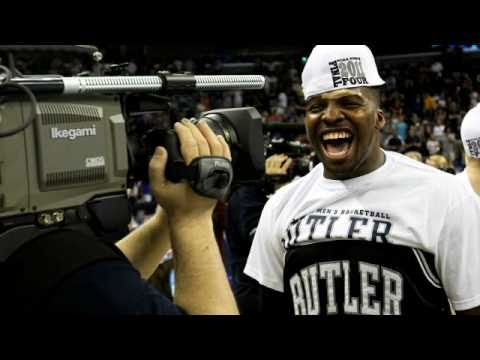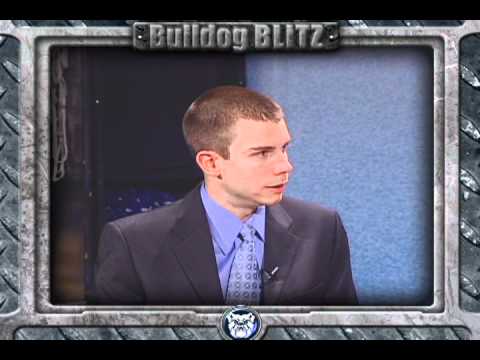- Job Seeker Resources
- |
- Last Updated: February 14, 2024

Preparing Yourself for the Future of Sports Journalism

When I say Butler University what is the first thing that comes to mind?
Brad Stevens…Gordon Hayward…NCAA Finalist…Cinderella?
All those answers are right, but stop well short of defining the prestigious University.
“I remember watching one of their Sweet 16 runs in 2000s from a sports bar while I was living out in D.C.,” says current Butler faculty member Eric Esterline. “They were dismantling Louisville and I heard someone say ‘where is Butler, in Pennsylvania?’ No one would say that today!”
As a former executive sports producer in radio and current freelance field producer for Fox Sports 1 in addition to his faculty role at Butler, Esterline has witnessed the digital shift in sports journalism and understands the skills today’s students need to break into the competitive sports media world.
“As a journalist coming out of college you need to have a diverse skill set. You cannot just be a good writer. You need to be able to shoot and edit your own video and stills, you need basic coding skills, you need to understand data journalism, you need to understand how to optimize your stories for search engines and it wouldn’t hurt to have some graphic design skills too.”
That’s all?
For more on the changing world of sports journalism, here’s Eric Esterline:
I read a report the other day regarding the demise of newspapers and it concluded “more people are reading today than ever before, they just aren’t reading newspapers” – as someone deeply involved in sports journalism and multimedia, how do content creators today ensure they don’t fall into the same trap newspapers did?
Esterline: The digital transformation is really coming to a head in the journalism world. News outlets, especially newspapers, can no longer just copy and paste their print stories on to the web. You need to engage your viewers at a new level and in different ways. Outlets like Buzzfeed, Deadspin, Grantland, Huffington Post, etc. really seem to be leading the way in this transition.
You need multimedia elements in your stories. It can be as simple as a photo gallery and a few hyperlinks that adds depth to the story or it could be as complex as a story like Snow Fall from the NYTimes. If you are doing long form journalism now and are really trying to tell a story with depth, you MUST engage your readers with multimedia elements.
I think the two most important skills today's students need in addition to tactical skills like writing, editing, shooting and coding, are the ability to research and adapt.
By research I mean the ability to problem solve and figure it out on your own. With the web at your fingertips, you can find out or figure out pretty much anything, but need to be able to sift through to find out how to complete your task in a timely manner.

All students need to be able to adapt to so many different situations, personalities and technology. No tunnel vision is allowed in this day and age. Diverse skill sets professionally, socially and technically will go a long way!
You cannot be just good at writing or just good at providing statistical information or just be a "people person". Diversify your skill set from day one.
I don't just have production students that help with our live streaming. I encourage, all students to join. We have public relations students, we have journalism students and we even have pharmacy students that help with the production of our events
Another key skill is really understanding social media as a journalist. Utilize social media to not only brand yourself but utilize it to connect to your readers/viewers, utilize it to help you with researching stories and become savvy at writing your headlines for social media, especially under 140 characters.
You also must be adept at executing your stories for multiples platforms. Depending on the news outlet you work for, you could be pushing your content to the web, TV, radio or all three!
You referenced the sports productions students can be a part of at Butler – what are the specific skills these students are learning as part of the production, and do they translate to the real world?
Esterline: The students are learning a lot of basic live production skills. Learning to run cameras and other production equipment for sporting events, though is just the tip of the iceberg, I think.
We have duties ranging from talent, camera, director, producer, graphics, replay, but the main skill is learning to work as a team. I have a pool of about 20 or so students that are available to work games and just like in the real world of live sports production, you are not always working with the same folks.
A lot of freelance people are utilized in the real world so you have to learn how to adapt to different skill sets and personalities and I think that is an important trait. At the same time, some of the students are learning a new level of responsibility.
Whether it is just showing up on time and participating in setup and tear down, or as a producer creating rundowns and maintaining professional conduct throughout the broadcast. I think the technical skills are great, but I think the people skills and the tiered level of responsibilities that the students learn as they grow in the program are just as important if not greater.
When I broke into the sports television world social media didn’t exist, now Twitter Wars are the lead story on Sportscenter … in your big picture perspective, has social media helped or hurt sports journalism?
Esterline: Big picture it has helped. I am going to give you some examples of why it has not first though.
The Richard Sherman's, Skip Bayless', Steven A. Smith's of the world are just examples of how not to utilize social media, or maybe good examples of how to, if your intention is to gain attention!
What I always tell my students is that this is all brought about by the 24 hour news cycle. If we didn't have these 24 hour news outlets, some of these exaggerated personalities would never exist. We would not need Skip Bayless, Bill O'Reilly or Nancy Grace. We would just be getting the news and not the opinions of folks veiling those opinions as news.
"Think before you post"
Never (well, almost never) respond to someone via twitter. So many people have way too much time on their hands to get you involved in Twitter battles and it is just not worth it. If you are a personality with a lot of followers, respond via a DM or at the very least, talk to your publicist first.
There are so many examples of athletes and high profile entertainers utilizing social media in bad ways. And these get exposed immediately.
It is a microcosm of sports journalism in general. We always hear the stories of negative use of social media, but there are plenty of examples of those that use it to promote charities, reach out to fans in a positive light, etc.
For journalists it is great though because you can "catch" athletes in moments of thought and expression where they maybe wouldn't say such in things in a locker room or after a game. Social media raises the exposure of all involved and sometimes it can be a good and bad. Those that use it well, it has really raised their amount of exposure and given them the ability to share their talents and skills with an audience maybe they would not have reached 10 years ago.
For athletes, it can be used for positive exposure but for the most part, it is negative exposure.
Tell us about the Sportscasting class you are going to be teaching at Butler – what are the principles you teach and what kind of hands-on experience do students get?

Esterline: The previous faculty member did a great job in giving the students the opportunity to create a sports show called the "Bulldog Blitz", but we are going to re-imagine the class and the show. I say "we" because I have singled out a couple of students early on to help in the re-imagination process so that they can really have some ownership in the process and the end product.
Our idea is to use the class as a content creation platform. The class will consist of 12-15 students and the students will have multiple responsibilities. Not only will they have "show day" responsibilities like director, anchor, producer, camera, etc. but they will also be responsible for the content of the show with covering their "beats" whether it is the latest Butler Men's soccer game or the Indianapolis Colts training camp. Or if it is a run down on results of the women's cross country team or a feature on former Butler Men's basketball player Gordon Hayward.
They will not only be producing this content for the show, but for the web too. They will also be encouraged to promote their work, the show, the site via social media. They do this as a team, but also individually through their own social media accounts.
A portion of their grade will depend on the amount of clicks their stories get or the amount of viewers the show gets on YouTube. Going beyond the actual production of the show, this gives them the opportunity to produce content on multiple platforms and become accountable in promoting their work which are both desired skill sets heading out into the real world.
This class is a part of the brand new Sports Media major at Butler University starting this fall.

Originally Published: March 26, 2014
Sign In or Register to access all articles and insider tips for help in your job search.
Search for Sports Jobs
RELATED JOBS
Drayer PT, a brand partner of Upstream Rehabilitation, is looking for a Physical Therapist to...
Physical TherapistDrayer PT, a brand partner of Upstream Rehabilitation, is looking for a Physical Therapist to...
Spring 2026 Internship Golf Tournament Operations-Free Travel And Housing (6/06)Spring 2026 Internship Golf Tournament Operations-FREE TRAVEL and HOUSING (6/06) Hurricane...
Changeover Crew (3Rd Shift, Part-Time)Changeover Crew (3rd Shift, Part-Time) Columbus Blue Jackets - Part Time Columbus OH Conversion...
Assistant Field Hockey CoachOhio Wesleyan University invites applications for the position of Assistant Field Hockey Coach....
RELATED RESOURCES
Find the Right Job Faster
- Get personalized job matches sent to your inbox every day
- Connect directly with employers before your competition
- Advance your career with expert advice on interviewing, salary negotiation, and more
We value your privacy




